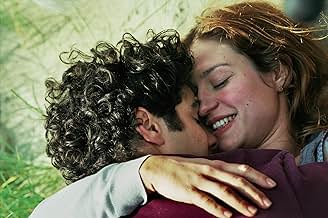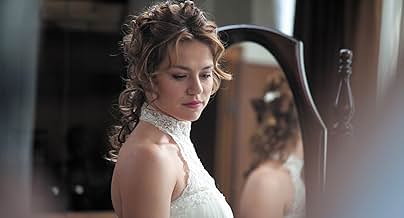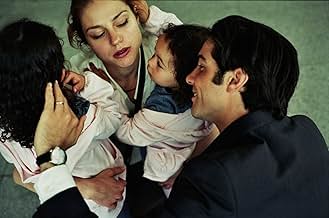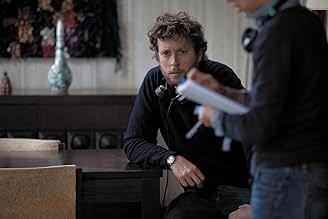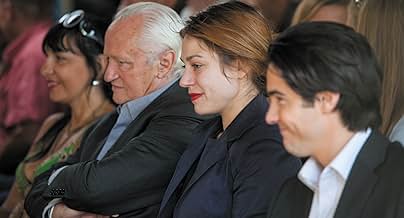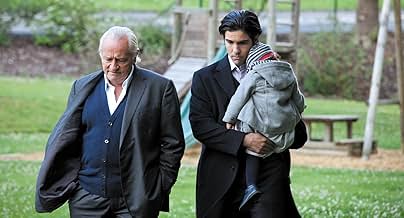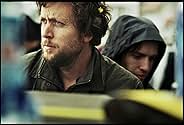AVALIAÇÃO DA IMDb
6,8/10
3,2 mil
SUA AVALIAÇÃO
Um médico adota uma criança e a cria como se fosse sua. Na idade adulta, o rapaz se casa e forma uma família, mas continua dependente de seu pai adotivo.Um médico adota uma criança e a cria como se fosse sua. Na idade adulta, o rapaz se casa e forma uma família, mas continua dependente de seu pai adotivo.Um médico adota uma criança e a cria como se fosse sua. Na idade adulta, o rapaz se casa e forma uma família, mas continua dependente de seu pai adotivo.
- Direção
- Roteiristas
- Artistas
- Prêmios
- 9 vitórias e 12 indicações no total
- Direção
- Roteiristas
- Elenco e equipe completos
- Produção, bilheteria e muito mais no IMDbPro
Avaliações em destaque
Depression is a terrible thing. The opening scene of 'My Children' tells us that an awful thing has happened, and the rest of the movie provides the background to the tragedy. It's a slow-paced film, and for much of its length, it feels too slow-paced for its own plot: it's not easy to see how the status quo is going to descend into tragedy within the allotted time. In the event, the end is sudden and not directly provoked: the cause is rather internal, the final snapping of its protagonist amid inner despair. Nonetheless, depression can be induced by real-world causes, and the film is actually, aside from its dramatic conclusion, an intriguing study of a subtly abusive relationship between an elderly doctor who in effect adopted a Moroccan family. In return for his generosity, he sought control, more control than any one person should have over the lives of others. Director Joachim Lafosse strangely shoots many scenes through out-of-focus doorways, a stylistic tic that I didn't quite understand; but this a powerful study nonetheless, a disturbing portrait of a family life that is superficially idyllic, but somehow not right nonetheless
The film sets out its stall very early, so we know within the first few minutes what we are about to see, but I spent ninety minutes in denial, hoping against all expectation that something would happen to change the course of the story.
The male characters are predictable without being cartoonish, but the female parts are outstanding. The Moroccan grandmother exemplifies the way the grandfather has been able to develop a God complex, critical of North African patriarchy while practicing it himself. It is the children's mother (Emilie Dequenne), though, who gives the most extraordinary performance. She is utterly compelling and places us, however unwillingly, into the position of the oppressed and abused. I am rarely a fan of child actors but Jade and Sohane could have been in a fly-on-the-wall documentary, so natural did they appear.
The end had a sense of horrific inevitability handled with the sympathetic discretion of Elvira Madigan, with the soundtrack adding to that comparison.
Staggeringly heartfelt, disturbing and painfully real. Truly devastating.
The male characters are predictable without being cartoonish, but the female parts are outstanding. The Moroccan grandmother exemplifies the way the grandfather has been able to develop a God complex, critical of North African patriarchy while practicing it himself. It is the children's mother (Emilie Dequenne), though, who gives the most extraordinary performance. She is utterly compelling and places us, however unwillingly, into the position of the oppressed and abused. I am rarely a fan of child actors but Jade and Sohane could have been in a fly-on-the-wall documentary, so natural did they appear.
The end had a sense of horrific inevitability handled with the sympathetic discretion of Elvira Madigan, with the soundtrack adding to that comparison.
Staggeringly heartfelt, disturbing and painfully real. Truly devastating.
The film is directly inspired by the case of Geneviève Lhermitte, a Belgian woman who, in 2008, brutally murdered her five children.
What in the world drove this hitherto model mother to such a barbarous act... is the anguished question asked by writer-director Joachim Lafosse (also Belgian) in this intense if somewhat restrained drama. A question all the harder to answer when the deplorable "heroine" of this family tragedy was at a loss, as she put it, "to understand what has happened, for I still haven't understood. I acted the opposite way to what I thought."
Lafosse cannot provide THE answer, it goes without saying. How could he since the real-life murderess in person proved unable to understand herself? But he tries hard to come as close to the truth as possible. In any case, he refuses to condemn her. Instead, he describes thoroughly all the stages of the way of the cross she undergoes before committing her irreversible act.
Co-written with Matthieu Raynaert and Jacques Audiard's favorite screenwriter Thomas Bidegain, "A perdre la raison" indeed follows the various developments of the affair very realistically even if the names and a few details have been changed (after all this is a fiction work, not a documentary) : Geneviève has become Murielle and her husband is named Mounir instead of Bouchaib. Plus, the couple in the fiction has four children whereas they had five in the real situation. As for their evil genius, he is not Dr. Michel Schaar any longer, but Dr. André Pinget. Basically however, all the seeds of the tragedy sown in real life are present in the fiction and in it too the wild wind cannot but be reaped: once established the toxic relationships between Murielle (who craves the intimacy of a love nest), Mounir (whose gratefulness to his foster father lets him invade it) and André (who gives the couple everything but controls their lives from A to Z), the infernal machine is activated and – a constant in classic tragedy – nothing can stop it.
Such an approach will naturally be effective only if it rests on strong acting performances, which is fortunately the case here. Emilie Dequenne ("Rosetta", "La fille du RER") is deeply moving as Murielle, this Mother Courage - Mater Dolorosa turned Medea, while Tahar Rahim ("Un prophète", "Grand Central") translates to perfection Mounir's affectionate but weak temperament. As for Niels Arestrup ("Un prophète", "Diplomatie"), the formidable actor proves more menacing and terrifying than ever in the role of the couple's Nemesis hiding beneath a friendly exterior.
Quite a gripping work, "A perdre la raison" is a film experience you will find hard to forget. Both a cold analysis of a tragic news event and the sympathetic portrait of a desperate woman, it is one of the most impressive movies shown in 2012.
What in the world drove this hitherto model mother to such a barbarous act... is the anguished question asked by writer-director Joachim Lafosse (also Belgian) in this intense if somewhat restrained drama. A question all the harder to answer when the deplorable "heroine" of this family tragedy was at a loss, as she put it, "to understand what has happened, for I still haven't understood. I acted the opposite way to what I thought."
Lafosse cannot provide THE answer, it goes without saying. How could he since the real-life murderess in person proved unable to understand herself? But he tries hard to come as close to the truth as possible. In any case, he refuses to condemn her. Instead, he describes thoroughly all the stages of the way of the cross she undergoes before committing her irreversible act.
Co-written with Matthieu Raynaert and Jacques Audiard's favorite screenwriter Thomas Bidegain, "A perdre la raison" indeed follows the various developments of the affair very realistically even if the names and a few details have been changed (after all this is a fiction work, not a documentary) : Geneviève has become Murielle and her husband is named Mounir instead of Bouchaib. Plus, the couple in the fiction has four children whereas they had five in the real situation. As for their evil genius, he is not Dr. Michel Schaar any longer, but Dr. André Pinget. Basically however, all the seeds of the tragedy sown in real life are present in the fiction and in it too the wild wind cannot but be reaped: once established the toxic relationships between Murielle (who craves the intimacy of a love nest), Mounir (whose gratefulness to his foster father lets him invade it) and André (who gives the couple everything but controls their lives from A to Z), the infernal machine is activated and – a constant in classic tragedy – nothing can stop it.
Such an approach will naturally be effective only if it rests on strong acting performances, which is fortunately the case here. Emilie Dequenne ("Rosetta", "La fille du RER") is deeply moving as Murielle, this Mother Courage - Mater Dolorosa turned Medea, while Tahar Rahim ("Un prophète", "Grand Central") translates to perfection Mounir's affectionate but weak temperament. As for Niels Arestrup ("Un prophète", "Diplomatie"), the formidable actor proves more menacing and terrifying than ever in the role of the couple's Nemesis hiding beneath a friendly exterior.
Quite a gripping work, "A perdre la raison" is a film experience you will find hard to forget. Both a cold analysis of a tragic news event and the sympathetic portrait of a desperate woman, it is one of the most impressive movies shown in 2012.
Few artists can do what Mister Arestrup does.A character actor in the noblest sense of the word,he never gives you the impression he overplays ;yet,he can be frightening ,makes you blood run cold ,while remaining extremely restraint.In the five last years ,his two portrayals (the wine-grower in "Tu Seras Mon Fils " ,and the stepfather in "A Perdre La Raison") are among the most impressive in the contemporary French cinema.
A Young couple (she is a French Teacher,he is a Morrocan immigrant)sees their life ,slowly but inexorably ,elude them.The Young man's stepfather he calls his Godfather provides them with everything a Young couple may wish :no problem to make ends meet .But the lack of intimacy becomes hard to bear for the Young woman who would like to share a true home with her husband.But the wealthy man does not want his protégés to run away and he 's using financial blackmail as well as emotional blackmail.They are under "tutelage" :the Young man ,who seems immature sees his protector as a merciful God but his wife is not prepared to accept it.This house is not big enough for the three of us.
It's putting off the inevitable;the last scene ,showing the house of "happiness" ,filmed in fixed camera shot ,could not have been more harrowing.
A Young couple (she is a French Teacher,he is a Morrocan immigrant)sees their life ,slowly but inexorably ,elude them.The Young man's stepfather he calls his Godfather provides them with everything a Young couple may wish :no problem to make ends meet .But the lack of intimacy becomes hard to bear for the Young woman who would like to share a true home with her husband.But the wealthy man does not want his protégés to run away and he 's using financial blackmail as well as emotional blackmail.They are under "tutelage" :the Young man ,who seems immature sees his protector as a merciful God but his wife is not prepared to accept it.This house is not big enough for the three of us.
It's putting off the inevitable;the last scene ,showing the house of "happiness" ,filmed in fixed camera shot ,could not have been more harrowing.
In 'Our Children' - based on the tragic real events of Brussels mother, Geneviève Lhermitte, who, in 2007, killed her five children - writer-director Joachim Lafosse skillfully shows how a comfortable domestic environment gradually becomes a prison for a woman and subtly suggests the reasons why she might be driven to commit her hideous crime. So raw it's almost unbearable. But the movie really belongs to Emilie Dequenne. Her portrayal of a character's descent from free spirit to crushed soul is spellbinding and makes this tragedy all the more heartbreaking.
Você sabia?
- CuriosidadesThe official entry of Belgium to the Best Foreign Language Film at the 85th Academy Awards 2013.
- ConexõesReferences Rocky III - O Desafio Supremo (1982)
Principais escolhas
Faça login para avaliar e ver a lista de recomendações personalizadas
- How long is Our Children?Fornecido pela Alexa
Detalhes
- Data de lançamento
- Países de origem
- Centrais de atendimento oficiais
- Idiomas
- Também conhecido como
- Perder la razón
- Locações de filme
- Dudelange, Luxemburgo(town hall for the wedding ceremony)
- Empresas de produção
- Consulte mais créditos da empresa na IMDbPro
Bilheteria
- Faturamento bruto nos EUA e Canadá
- US$ 23.203
- Fim de semana de estreia nos EUA e Canadá
- US$ 5.500
- 4 de ago. de 2013
- Faturamento bruto mundial
- US$ 700.215
- Tempo de duração
- 1 h 51 min(111 min)
- Cor
- Mixagem de som
- Proporção
- 2.35 : 1
Contribua para esta página
Sugerir uma alteração ou adicionar conteúdo ausente



